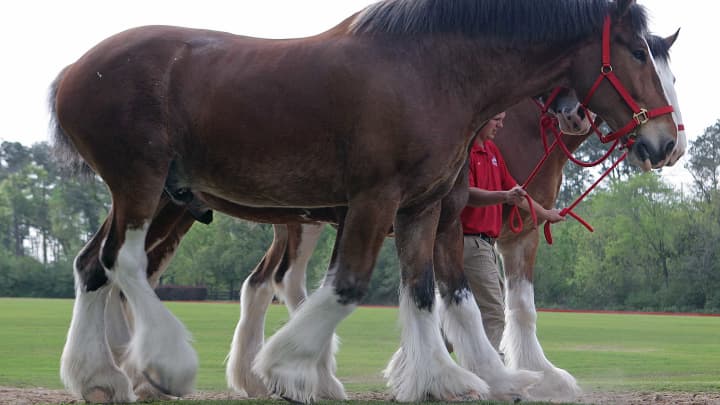
InBev said it will no longer cut the tails of the iconic Clydesdale horses used in its signature Budweiser commercials and at events, following extended backlash from animal rights groups.
The beverage maker, which has seen sales suffer after criticism of its with transgender activist Dylan Mulvaney, debuted its horse-drawn beer wagon nearly a century ago to celebrate the repeal of Prohibition of beer. The Clydesdale horses instantly became a hit with audiences and Anheuser-Busch has since used them in hundreds of appearances across the country each year for parades, television commercials and Super Bowl events.
However, the practice known as "docking," which can involve cutting through a horse's tailbone, has come under scrutiny. Anheuser-Busch on Wednesday said it has stopped cutting off tails.
"The practice of equine tail docking was discontinued earlier this year," a spokesperson for the company said. "The safety and well-being of our beloved Clydesdales is our top priority."
Tailbone amputation for cosmetic reasons is illegal in 10 states and multiple countries. The American Veterinary Medical Association has also condemned it.
People for the Ethical Treatment of Animals said an investigation it conducted found Budweiser horses had their tails docked for cosmetic reasons, and it decried the practice as "crude mutilation." PETA said it found some representatives for Anheuser-Busch have said they trimmed the hairs on the tails rather than cut them off.
Earlier this month, an international coalition of animal protection organizations, including PETA, sent a to Anheuser-Busch urging the beer maker to end the practice. PETA even purchased stock in the company to voice concerns at shareholder meetings, in addition to protests and other actions the group took.
In a statement to CNBC, PETA said it's celebrating the beer maker's decision to stop cutting horse tails by "cracking open some cold ones."
In addition to saying it would stop the practice, the company also announced a new partnership with American Humane, the world's largest certifier of animal welfare practices.



